Articles and Home Owner/Buyer Information
So you found your dream home,
Now what?
As soon as you receive an accepted offer, it is time to schedule your Home Inspection!
Your Realtor should provide you with at least 2-3 Home Inspection Companies to choose from. They are not allowed to influence your decision beyond that. Most often these are Home Inspectors they have used in the past. That does not always mean that they are the best Home Inspector for you but, sometimes it is exactly the type of home inspector you need. Keep in mind, your Realtor is hoping to close the deal smoothly and collect a commission. The Home Inspectors the Realtor gives you are probably not the worst home inspectors either, remember, even though the Realtor wants the deal to go smooth and easy, they do not want a home inspector who will miss something BIG that can come back on them for referring the inspector. You on the other hand, want to be sure you know everything you can about the home. You have a large investment to protect, and you and your family need to feel safe in your new home.
So how do you decide? You can look for Home Inspectors on the internet, or ask a friend or family that has had a Home Inspection done by a licensed Home Inspector. You also have the companies your Realtor has provided. But… before you make that first call, prepare your questions and keep in mind 2 things. First, do not hire a Home Inspector on price alone. Do not hire someone fresh out of home inspection school, they may have a license, but to be able to inspect a home they need lots in the field training from a seasoned inspector. You know the saying “You get what you pay for!” When it comes to home inspectors, most of the time that is true. The cheapest guy is probably not the best choice, because they are so cheap, they can’t afford to take the time to do a thorough inspection, answer your questions, and write a report that you will understand or they are so new that they will work for next to nothing to try get experience. Do you want your new home to be where they practice? Because someone charges a lot more does not mean they are the best either. Usually somewhere in the middle is where you will find the best inspectors. Second, if they don’t answer when you call, or return your call quickly, most likely they won’t answer when you have important questions later! If they can not do anything but a basic home inspection, you will have to find someone else to do additional inspections later if needed.
So how do you choose the right home inspector?
Some Basic Questions To Ask:
Do they have a Home Inspection License?
You would be surprised at how many inspectors try to operate without a license.
Are they nationally certified? (e.g. InterNACHI)
Inspectors that are nationally certified are held to a higher standard. They have to pass a national exam, not just a state exam. Every year they must complete additional educational courses so they will be trained in latest building techniques and processes.
Do they have any reviews or references from other clients?
Inspectors that show references most likely have been in business a while. They know how to deal with problems should one come up. Inspectors with good reviews should give you a sense of comfort. If you ask, they may even be able to put you in contact with the person who gave the review so you can speak with them directly.
Do they actually get on the roof to inspect it properly?
According to the standards of practice inspectors do not have to get on roofs, in most cases they do not have to enter attics, or enter crawlspaces. Some of the best inspectors will go way beyond just the standard or minimal requirements to provide an exceptional inspection.
Are they certified to perform other inspections you may need? ( WDO/Termite, Wind Mitigation, Pool & Spa )
As mentioned earlier, inspectors that are not trained or certified to perform these additional inspections will leave you searching for another inspector at later time in the event you happen to need one to close your deal. Also, without training in these areas how do you know they did not miss something. After all, even if the inspector performing your inspection is not actually doing a termite inspection, there is good chance he will be able to alert you to the possibility of termites because he is trained to recognize what they look like.
How quickly will you receive your report?
Inspectors that give you the report at the end of the inspection might sound great, but they haven’t taken the time to think about the findings, research possible issues, address any concerns or questions you may have after the inspection. Inspectors that take 2-3 days to get you the report are not any good either. Taking to long may put you at or past your inspection objection deadline, to late for you to make an educated decision. It also may not give ample time to have a specialist or contractor evaluate an issue that was found during the inspection. The better inspectors will generally have the report to you within 24 hours after the inspection has been completed.
And finally, what will the Home Inspection cost?
I can not stress this enough. BUYER BEWARE! cheaper is not always the best. One inspector might charge $300 whereas another might charge $150 for the same inspection. A home is the biggest most expensive purchase you will ever make. Is a $150 really worth risking something not being found. Quite often that is exactly what happens, something is missed. If $150 is that important to you, maybe save the money and skip the inspection, because if the cheap guy misses something, you just payed him to do what you could have done… miss something. You won’t hesitate to spend $150 to upgrade to a bigger TV, to add an extra feature when buying a car, buy a little something special on your next vacation. So why not hire the better inspector, your house will still be there after the car, TV, and souvenir have gone away.
We hope this information has been helpful. We also hope you will give us a call, we would be glad to answer your questions and schedule your next Home Inspection. 407-878-7808
‘AS always we are here for you before, during and after each Inspection!’
Why You Need Homeowners Insurance
The largest and most expensive purchase you ever make is most likely your home. Homeowners insurance will help protect your home, possessions, and liability. Homeowners insurance is a package type policy. It contains four types of coverage. Dwelling and personal property, personal liability, medical payment, and additional living expenses.
Property Damage Coverage
Dwelling and personal property coverage will pay for damage to the structure, personal property, including household furniture, clothing, and other personal belongings. It will also cover damage to other structures such as a detached garage and other out buildings on the property. The amount that is paid for personal property and out buildings is usually a percentage of the main policy. You should check with your agent to be sure the coverage is sufficient for your situation. Coverage is usually for “cash” value rather than “replacement cost. Again, check with your agent to make sure you have the correct coverage for your needs.
Personal Liability Coverage
Personal liability coverage is for non-auto related claims. If the injury or damage is caused by you, a member of your family, or your pet the liability coverage in your policy pays both for the cost of defending you and paying for any damages that you must pay. Liability insurance does not have a deductible that you must meet before your insurer begins to pay losses. Check with your agent to make you have enough coverage to protect your assets.
Medical Payment Coverage
Medical payment coverage is for someone outside your family, This means if a friend or visitor is injured at your home, regardless of fault they are covered. This includes payment for reasonable medical expenses incurred within one year from the date of loss. This portion of your homeowners policy will also pay if you are involved in the injury of another person away from your home in some circumstances.
Additional Living Expenses
Additional living expenses coverage is for just what it sounds like. If it is necessary for you to move into a motel or apartment temporarily because of damage to your dwelling for a covered event, your insurance company will pay an amount up to 20% of the policy limit on your dwelling for these expenses. It will not pay if you stay with a friend or family member, you must actually incur expenses.
Home Business
If you operate a home business full or part time, you will want to check with your agent to see whether or not you have coverage for a business at home. Most policies have no coverage or very little coverage.
Prices vary quite a bit
from one insurance company to the next.
Here are some things to consider when buying
homeowners insurance:
Shop Around
Insurance is a very competitive business, just like many other businesses, you can find some deals on your insurance payments. Talk with several agents about what you own and what the best types of coverages they offer are. Then compare policies and prices. You might save a substantial amount of money by making a small adjustment in your coverage. Different companies insurance things differently.
Consider having a Wind Mitigation
or 4 Point insurance inspection done.
A Wind Mitigation is a type of inspection that tells the insurance company how your roof is attached to your home. Items that are looked at are, what type and age is the roof covering. What types of nails and/or fasteners hold the sheathing or roof deck to the trusses. How the trusses are connected to the walls, is it clips, straps, or toe nailed? The insurance company will apply credit to your premium based how many and what types of these features your home has. In some cases homeowners can save between $200-$400 a year off of their insurance premium.
A 4 Point Inspection is an evaluation of the 4 major areas of the home. They are the roof, plumbing system, heating and cooling system, and electrical system. Insurance companies use this report to determine the level of risk they will assume if they place coverage on a home. The better the condition of your home, the lower your insurance will be. This inspection is used mainly for homes 30 years of age or older. If you own an older home and have done some upgrades, such as installed a new heating and cooling system, or upgraded your electrical panels, a 4 Point inspection might help lower the cost of your premium. If you have questions about this please give us a call or ask us the next time we do a maintenance inspection.
Raise your deductible
Deductibles are the amount of money you have to pay toward a loss before your insurance company starts to pay a claim. The higher your deductible, the lower your premium will be. If you live in a hurricane prone region, you may have a separate windstorm deductible. Just make sure you have access to the funds to cover the deductible if disaster strikes. For example if you normally have a couple of thousand dollars in a savings account, consider using that money if needed and raising your deductible to lower insurance premiums.
Don’t confuse what you paid for
your house with rebuilding costs
Do not insure the land for which your house sits on as part of your replacement costs. The land will not go anywhere. Understand that what you paid for your house is probably less than what it would cost to rebuild it in the event of a total loss. Ask your agent about how much you are covered for.
Buy your home and auto policies
from the same insurer
Group all of your insurance policies together with one company. Many times insurance companies will offer discounts if you combine home, auto, life, etc together.
Improve your home security
Some insurance companies will offer a discount if you install a security system. Some offer discounts for a sprinkler system of fire alarm system. Not all of these systems are cheap, you will want to check and see if the savings are worth it.
Maintain a good credit record
Insurance companies look at your credit score in calculating how much you will have to pay for insurance. Having a good credit score can help lower your premium.
When you’re buying a home,
do not forget to consider the cost of
homeowners insurance
Many factors play a part in this cost. The age, type, size, and location are just a few factors. Speak with a couple of agents in your area before house shopping to see what they recommend. This could be a significant savings.
Also remember that if you live in an area prone to disasters like hurricanes or floods, special types of insurance may be required. Those policies are usually an additional cost.
Below is a list of questions you should ask your
insurance agent to make sure you have the
right coverage:
Am I covered for direct losses due to fire, lightning, tornadoes, windstorms, hail, explosions, smoke, vandalism and theft?
Are my jewelry and other valuables covered?
If my house is totally destroyed in a fire and I have $150,000 worth of insurance to cover the structure, will this be enough to rebuild my home?
Am I automatically covered for flood damage?
If a pipe bursts and water flows all over my floors, am I covered?
What if water seeps into my basement or slab from the ground am I still covered?
A neighbor slips on my sidewalk or falls down my porch steps and threatens to take me to court for damages. Does my policy protect me?
A tree falls and damages my roof during a storm. Am I covered?
During a storm, a tree falls but does no damage to my property. Am I covered for the cost of removing the tree?
If a storm causes a power outage and all the food in my refrigerator and freezer is spoiled and must be thrown out, can I make a claim?
My children are away at college. Are they covered by my homeowners insurance?
My golf clubs were stolen from the trunk of my car. Does my homeowners policy cover the loss?
I have a small power boat. If it is stolen, am I covered? What if there is a boating accident and I get sued? Am I covered for that?
My house is close to the ocean. I’ve heard that if it is destroyed by the wind, the town’s new building code requires me to rebuild the house on stilts. This will add $30,000 to the cost of rebuilding my house. Am I covered for this extra cost?
Am I covered for “acts of God”?
What should I do if my policy provides less coverage than the HO-3?
What is it?
How does it effect homeowners insurance
when buying or selling a home?
When offering a home for sale, the seller needs to get top dollar and sell it as fast as possible. At the point when purchasing a home, the future buyer needs to get their money’s worth from the property with minimal redesign cost. Tragically, with the presence of Polybutylene plumbing that can become difficult for both buyer and seller.
What Is Polybutylene?
Manufactured and utilized from 1978 until 1995, Polybutylene piping is a water supply piping that was less costly, more adaptable, and simpler to install than copper piping. It is mostly found in the “Sun Belt” because of the substantial housing development from the 1980s through the mid-1990s. On the other hand it has been found to some degree in homes constructed as late as the mid 2000’s. It likewise has been found in homes constructed much before the 1980’s. For instance, homes manufactured in the 50’s and 60’s have been found to be re-piped in the mid-80’s with Polybutylene. It is believed to have been installed in 6 to 10 million homes all through the United States and utilized as a part of re-piping some more.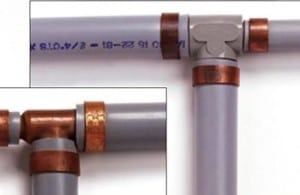
Not just was Polybutylene piping (photo at right), (photograph acquired from nachi.org) utilized inside the homes for water supply systems, but, additionally for outside underground water mains. It commonly is 1/2 to 1-inch in diameter and can be in different colors. The most widely recognized colors are Gray, White, Black. Gray being the most common. The lines for the most part are stamped with the code “PB2110” however may likewise say “QEST”, “QUEST”, or “VANGUARD”. The best places to check for it are the water supplies for the sinks and toilets. At the water meter, main water valve and water heater and where the water supply enters the home. Note that occasionally Polybutylene piping was utilized with copper piping at some points; so, just because you can not see Polybutylene piping in the open does not mean it is not still in the walls.
Also, many times it is mistaken for other types of piping, for example: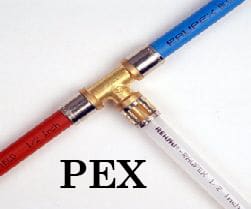 PEX(photo borrowed from nachi.org)
PEX(photo borrowed from nachi.org)
The Problems with Polybutylene
It has never been scientifically proven, but it is believed that oxidants in the water supply systems, such as chlorine, react with the Polybutylene piping material, causing it to flake apart on the inside of the piping. Eventually, small fractures deepen, cracking through the pipe, and it begins failing. Manufacturers contend that most of this occurs at the connection points; for this reason the manufacturers believe the problem is caused by improper installation. Whatever the real cause, it weakens the water supply system, which can fail without any warning causing both personal property and building damage. The older the pipe, the more likely a problem can occur. Another issue that has recently surfaced is most insurance companies will not write coverage on a home that contains this type of plumbing system. When buying or selling a home, changing insurance companies, or if a 4 Point inspection is asked for by an insurance company, the type of plumbing system is noted making obtaining insurance very difficult.
However, not every PB system fails, but the material is susceptible to corrosion when it comes into contact with chlorinated water, resulting in breakage and splitting of PB piping. Throughout the 1980s, lawsuits for alleged defective manufacturing and defective installation for hundreds of millions of dollars in damages were filed. Some homeowners had (and many still have) problems with their insurance companies.
In some cases, homeowners are finding that homeowners insurance companies will either cancel their coverage when extensive damage is caused by [Polybutylene] or refuse coverage to homes piped with Polybutylene.
What Should Realtors, Sellers, and Buyers Do?

Before the majority of the Polybutylene piping lawsuits that happened in the 1980’s, you could tell buyers that a house is being sold “as is”. Raynor v. Shrewd Realty Co., 504 So. 2d at 1364 and Johnson v. Davis, 480 So. 2d at 628, on the other hand, demonstrated that the courts are moving toward taking out the feeling that all is well with the world where sellers and real estate agents felt comfortable, deciding in favor of new buyers over sellers and their agents. Different jurisdictions have different laws concerning real estate agent disclosure, however it appears that judges across the nation are taking a closer look at “what is the correct thing to do” for every situation. So as a Realtor you have to protect yourself. When you speak to a buyer, you need to protect their interests (and yours) by inquiring as to whether the home has Polybutylene pipes and strongly recommend they get a home inspection (Note that a home inspection can just let you know whether there are Polybutylene pipes present in a home, not if and when they may fail.) Also, as you show the home, do some checking yourself under the sinks and at the water heater.
In the event that it has Polybutylene plumbing, inquire as to whether the seller is going to replace the plumbing or give a comparable reduction in the cost of the home. On the off chance that a reduction in value is given, you then need to talk with your client about the need to do a replacement of the piping in the near future. Understand that this may only work sometimes. On the off chance that the house is being sold and will require a 4 Point inspection, insurance agencies may not insure the home until the pipes has been replaced. This means that without insurance the purchasers may not be able to get a home loan to continue with the purchase of the home. When Polybutylene pipes are found to be in the home, protect yourself with a written disclosure of the presence of Polybutylene to your buyer, keeping a duplicate for your records with the client initialing. Incorporate in the written disclosure that a large number of Polybutylene pipes have failed. You also should have the client consent to a waiver agreement, expressing you uncovered Polybutylene and releasing you of any liability. At that point, on the off chance that they don’t replace the piping and it fails, they can’t say you didn’t caution them and take you to court.
If it does have polybutylene pipes, ask if the seller is going to replace the piping or give an equivalent reduction in the price of the home. If a reduction in price, you then need to discuss with your client the need to do a replacement of the piping. Understand that this may only work sometimes. If the home is being sold and will need a 4 Point inspection, insurance companies may not write a policy until the plumbing has been replaced. This means that without insurance the buyers will not be able to receive a mortgage to proceed with the purchase of the home. When polybutylene pipes are present, always protect yourself with a written disclosure of the situation to your client, keeping a copy for your records with the client initialing. Include in the written disclosure that hundreds of thousands of polybutylene pipes have leaked and a single leak can cause catastrophic damage. You also should have the client sign a waiver agreement, stating you disclosed this information and freeing you of any liability. Then, if they don’t replace the piping and it leaks, they cannot say you didn’t warn them and take you to court.
When you speak to a seller, check for Polybutylene pipes, requesting a home inspection or pre-listing consultation for them. In the event that they have Polybutylene pipes, recommend they replace them with copper, PEX, or CPVC plumbing. It takes around a week for re plumbing for the normal home, The expense is about the same as recarpeting the home, You will have the new plumbing system to use when marketing the home stating new supply piping has been installed. They have a greater shot of getting their asking price or more, and hopefully the home sells faster too. In the event that the owner does not to replace the Polybutylene pipes, give them a release agreement to sign that shields you from all potential liability.
All in all, Polybutylene pipes are substandard and present real estate agents, sellers, and buyers with issues while trying to buy or sell a home. Remember, the pipes are similar to ticking water bombs. Make sure to get a home inspection.
Home Inspector serving Orlando, , Deland, Daytona, Apopka, Deltona, Eustis, Daytona Beach, Dr. Phillips, Altamonte Springs, Casselberry, Winter Springs, Lake Mary, Sanford, Longwood, Oviedo, Home Inspection Orlando
Aluminum Wiring
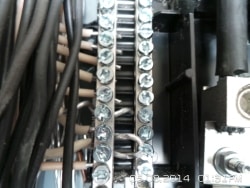
Aluminum Wiring
In the 1960s and early 1970s, many homes were wired with aluminum. Copper wiring became very expensive, so builders turned to the cheaper alternative. Aluminum wiring isn’t inherently an issue, but the ways it was installed at the time caused, and continue to cause, dangerous and fatal house fires.
A house typically has hundreds of connections. Aluminum wires are more brittle than copper, this type of wiring is damaged easier than copper which can lead to more hot spots and overheating connections at outlets, electrical panels, switches, etc.
Over time aluminum wiring continues to expand and contract which can weaken the ends of the wires where they connect to screws and cause a fire if it gets too hot. It’s also possible for aluminum wires to rust or corrode, which can cause major issues.
Can I Get Homeowners Insurance With Aluminum Wiring?
Yes… But you will probably have to do some type of remediation. Some examples are installing copper pigtails at all connections using COPALUM or AlumiConn connectors.
Even then it still may be necessary to have the home re-wired. As of the writing of this article fewer insurance companies will write coverage for homes with Aluminum wiring and the list is getting shorter by the day. Homes with aluminum wiring represent an increased fire hazard. To compensate for the greater financial risk, an insurer will charge more to cover it or exclude coverage to damage by faulty wiring. Be sure to read and understand your policy carefully.
This condition is something that is noted on a 4 Point Insurance Inspection. Depending on what type of remediation that has been done will depend on whether an insurance company will write coverage. What is important is that this work be done by a licensed electrician and all work be documented. Having the homeowner go to a big box store and buy the connectors then do the work themselves will not work for an insurance company.
In closing, if you buy a home with Aluminum wiring today and are able to get insurance understand you may not get insurance down the road without doing some expensive work.
Cloth Covered Wiring
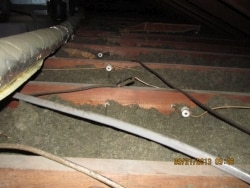
Knob and Tube
Cloth covered wiring is a very confusing subject. Typically you will find 3 types.
- First type is normally called “Knob and Tube” wiring. I know, most people would not even classify this as cloth wiring but I felt it should be mentioned. This was used in homes built in the late 1800’s to early 1900’s. By now most homes that had this type of wiring have been re-wired so it is rare but not impossible to find it.
 Cloth Covered Wiring
Cloth Covered Wiring
- Second type is a tin coated copper wire with rubber wrapped around it and then covered with cloth. This type of wiring was typically used in homes built in the mid 1900’s. It is still frequently found and is the type of cloth wiring insurance companies do not like to write coverage for. The reason is because over time the rubber insulation becomes brittle and hard. Then cracks which could allow the conductors to touch each other or the surrounding area which is a fire hazard. The only solution for this is to replace the wiring.
- Third type of wiring is a copper conductor wrapped in a PVC sleeve and then wrapped in cloth. This type of wiring was typically used later in the 1900’s. The good news is if you have this type of wiring you do not need to worry about insurance issues. The bad news is many times it can be mistaken for the second type of wiring mentioned above. If you believe this is the case give us a call or have it looked by a licensed electrician.
No matter what type of wiring you have and no matter if an electrician says it is fine if you have type one or two you will most likely not be able to get insurance.
Ever wonder why your utility bill keeps going UP!
Here are a few small changes to give you BIG Savings on your energy bills!
- Install Ceiling Fans – by circulating the cool air you feel cooler!
- Replace Air Filter every month.
- Program your thermostat so you are only using energy when you are actually home.
- Block the sunlight heat with blinds or curtains.
- Consider installing a tankless water heater which only heats water when you need to use it.
- Seal and insulate around windows, doors and outlets and add insulation to attic.
- Stop wasting water by installing low flow shower heads and toilets.
- Get in the habit of turning it off or unplugging items you are not using.
- Sunlight is free, use it whenever possible.
- In the Kitchen – use the microwave when possible.
- Laundry – run full loads and use cold water.
- Replace old style light bulbs with the new energy efficient LED bulbs.
Want more information?
CALL NOW 407-878-7808!
Save yourself time and money by having the tools to do simple Home Repairs…instead of calling a plumber, handyman or other costly contractors.
Plunger
Combination Wrench set
Slip-joint Pliers
Adjustable Wrench
Caulking Gun
Flashlight
Tape Measure
Hacksaw
Torpedo Level
Safety Glasses
Claw Hammer
Screwdriver Set
Wire Cutters
Safety Mask
Duct Tape
By having these few inexpensive tools you can take care of most simple repairs, before they become expensive repair bills!
Want more information?
CALL NOW 407-878-7808!
Why do garages pose a fire hazard?
Where are you most likely to do any welding, or work on your car? These activities require working with all sorts of flammable materials and in some cases create sparks or other sources of ignition.
In Florida, water heaters are usually in garages, if it is a gas fired water heater they can create sparks that may ignite fumes or fluids.
Automobiles can leak oil and gasoline. These fluids may ignite without warning. It is recommended that you keep your vehicle maintained and clean up any spills.
Liquids such as gasoline, motor oil and paint are commonly stored in garages. All of these are very flammable. Some other examples of flammable liquids are brake fluid, varnish, paint thinner and lighter fluid.
The following tips can help prevent
garage fires and their spread:
You should have a fire extinguisher located in the garage. Check with your local fire department to make sure it is rated for the types of combustible materials you may have stored in the garage.
If the garage allows access to the attic, make sure a suitable hatch covers this access and that the hatch is fire rated. Typically a piece of 5/8″ fire rated Type X drywall will work.
The walls and ceiling should be covered with a fire-rated material. Typically this is Type X fire-rated gypsum. A home inspector can examine the walls and ceiling to make sure they are adequate fire barriers.
Keeping the floor and garage area clean is important. Loose papers, matches, oily rags, and other items may catch fire and spread.
Do not overload electrical outlets.
Tape down all cords and wires so they are not twisted or accidentally yanked. Do not use extension cords in place of permanent wiring. If you need additional outlets, consult with a licensed electrician about adding more circuits.
If there is a door that connects the garage
to the living area, consider the following:
Check and make sure the door is fire rated. Many times there will be a sticker on the edge of the door with a rating. We can check this for you at your next Maintenance Inspection.
Does the door have a window? A Home Inspector can inspect the window to tell you if it’s fire-rated. If it is not, you should consider replacing the door.
Look to see if the door has a self closing (or spring) hinge. Other types of self closing devices are available but, a hinge is the most common. While it may be inconvenient sometimes, especially when trying to carry groceries into the house from the car, it is still a good idea for the garage to house door to be self-closing. You never know when a fire will happen, and it would be unfortunate to accidentally leave the door open while a fire is starting in the garage.
Check to see if the weather seal around the door is in good condition. Any openings can allow dangerous fumes, such as carbon monoxide or gasoline vapor to enter the living area. A Home Inspector can recommend ways to seal the door so that fumes cannot enter the living area.
If you have items placed on the floor,
you should check for the following:
If you have a gas fired water heater, make sure it is at least 18″ above the garage floor. Dangerous fumes tend stay low to the ground and could ignite. If you have a newer FVIR water heater this rule may not apply, check with your Home Inspector if you are not sure.
Make sure your flammable liquids are clearly labeled, in self-closing containers, and only store small amounts. Keep them away from heaters, appliances, pilot lights and other sources of heat or flame.
Never store propane tanks indoors. If they catch fire, they can explode. Propane tanks are sturdy enough to be stored outdoors.
In summary, there are plenty of things that you can do to prevent garage fires from spreading to the rest of the house, or to keep them from starting in the first place. However, it is highly recommended that you have your garage periodically examined by an InterNACHI inspector as part of your regular maintenance.
A home’s air-conditioning system should be periodically inspected and maintained in order to operate correctly and efficiently . While an annual inspection performed by a trained HVAC technician is recommended, you can do a lot of the work yourself by following the tips offered in this article.
Clean the Exterior Condenser Unit, Coil and Components
The exterior condensing unit is the large metal box located outside of the building that is designed to take heat from the inside of the building to the outdoors. Inside of the metal box are coils of pipe that are surrounded by lots of thin metal fins that give the coils more surface area to exchange heat. Follow these tips when cleaning the exterior condensing unit and its inner components — after turning off power to the unit!
Remove any leaves, spider webs and other debris from the unit’s exterior. Make sure any vegetation is cut back several feet from the unit to ensure proper air flow.

Take off the cover grille to clean any debris from the unit’s interior. A garden hose can be helpful for this task. Use it carefully, to much pressure can damage the fins.
Straighten any bent or damaged fins with a tool called a fin comb.

Clean the condenser coil at least once a year. When it collects dirt it can cause the pressures in the system to rise, which puts tremendous strain on the compressor and will shorten the life of the system.
Inspect the Condensate Drain Line
Condensate drain lines collect condensed water and drain it away from the unit. They are located on the side of the inside fan unit, also known as the Air Handler. Sometimes there are two drain lines, a primary drain line that’s built into the unit, and a secondary drain line that can drain if the first line becomes blocked. Homeowners can inspect the drain line by using the following tips, which takes very little time and requires no specialized tools:
Inspect the drain line for obstructions, such as algae, insects, and debris. If the line becomes blocked, water will back up into the drain pan and overflow, potentially causing water damage to your home. On most newer systems there is a float switch that will turn off the HVAC system if the drain line becomes clogged. Many times you can tell if this has happened because the thermostat will not have any display. Note: If you have an Air Handler that is located in the attic or upper floor there may be a second drain line, be sure to flush this line as well. To clean this, you will need to locate the drain access. This is usually a short piece of 3/4 inch PVC pipe with a cap on it. You normally find this near the air handler. Remove the cap, ( just pull, it should not be glued on ) with someone watching the other end of the drain pour about a gallon of water into drain. If it comes out the other end, then the drain is working. Next, pour about a 1/4 to 1/2 gallon of vinegar into drain. If it is still draining then pour about 1-2 gallons of water to flush out vinegar. Repeat this for the secondary drain if you have one. That’s it! If the water and vinegar flowed out of the drain just fine then you are good, if this didn’t work sometimes you can use a long stiff wire to try and dislodge any blockage or put a wet dry vacuum on the drain line at the exterior and try to suck the blockage out. If it is still clogged you will need to contact a professional. It is also important to check this secondary line from time to time where it exits the home for any signs of water. If you see water coming from this drain, this is an indication that the primary drain is blocked. This condition needs immediate attention!
Check to make sure the large copper line that goes from the outside unit to the house is insulated. May times this insulation is missing or damaged. You can find replacement insulation at most home centers for a few dollars.
Clean the Air Filter
Air filters remove, dust and other particles that would otherwise circulate indoors. Most filters are typically rectangular in shape and about 20 inches by 16 inches, and about 1 inch thick. They slide into the main return air ductwork near the air handler or in an interior wall or ceiling. The filter should be checked every 30 days and washed or replaced, depending on the manufacturer’s instructions. A dirty air filter will not only degrade indoor air quality, but it will also strain the fan motor to work harder to move air through it, increasing energy costs and reducing energy efficiency. You may need to change the filter more often if the air conditioning system is in constant use, if you or your family members have respiratory problems, if you have pets, or if dusty conditions are present.
The Registers
Registers are duct openings in ceilings, walls and floors where cold air enters the room. Make sure they are not blocked by drapes, carpeting or furniture.
Other Maintenance
In addition, homeowners should practice the following strategies in order to keep their central air conditioning systems running properly:
Have the air-conditioning system inspected by a professional at least once a year. Annual service contracts are available by most heating and cooling companies. Many times discounts on repairs and priorities for service are given to those customers that have a service agreement.
Reduce stress on the air conditioning system by enhancing your home’s energy efficiency. Switch from incandescent lights to compact fluorescents or LEDs, which produce less heat.
In summary, any homeowner can perform regular inspections and maintenance to their home’s central air-conditioning system.
Orlando Home Inspection, Deland, Daytona, Apopka, Deltona Home Inspector, Winter Park Home Inspector, Daytona Beach, Altamonte Springs Home Inspector, Casselberry Home Inspection, Winter Springs, Lake Mary Home Inspector, Sanford Home Inspector, Longwood Home Inspection, Oviedo, Chuluota, Orlando Home Inspector – 32833 – 32825 – 34786 – 32750 – 32779 – 32714 – 32810 – 32751 – 32707 – 32835 – 32828 – 32801 – 32803 – 32806 – 32789 – 32746 – 32712 – 33880 – 33881 – 33884 – 33801 – 33805 – 33803 – 32922 – 32780 – 32822 – 32829 – 32839 – 32804 – 32806 – 32807 – 32701 – 32703 – 32708 – 32765 – 32792 – Best Home Inspection in Orlando
About 2.5 million children are injured or killed by unsafe conditions in the home each year. The good news is that many of these incidents can be prevented by using simple child-safety devices on the market today. Any safety device you buy should be sturdy enough to prevent injury to your child, yet easy for you to use. It’s important to follow installation instructions carefully.
Also, if you have older children in the house, make sure they understand the importance of re-securing the safety devices. Remember, no device is completely childproof; determined youngsters have been known to figure out how to disable them. Child-proofing your is not very expensive and most items you will need can be found at the local baby store or hardware store. Here are some child-safety devices that can help prevent many injuries to the little ones in the family.
Safety Latches: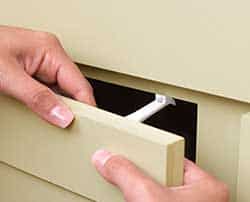
Use safety latches or locks for cabinets and drawers anywhere you store household cleaners, medicines, knives and other sharp objects, and any other poisonous items.
Find safety latches and locks that adults can easily install and use, but that are sturdy enough to withstand pulls and tugs from children. Easy to use safety latches are more likely to be used correctly, adults find them frustrating, they may stop using them. Safety latches are not a guarantee of protection, but they can make it more difficult for children to reach dangerous substances.
Safety Gates: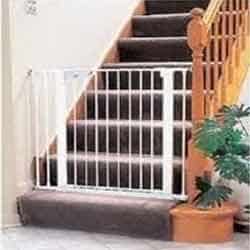
Safety gates help prevent falls down stairs and help keep children away from dangerous areas. Find safety gates that children cannot operate or damage easily, but that adults can open and close without difficulty. For the top of stairs, gates that screw into the wall are more secure than “pressure gates.”
We recommend the newer safety gates that meet the latest safety standards. If you have an older safety gate, be sure it does not have “V” shapes that are large enough for a child’s head and neck to fit into. These types of gates have been known to cause serious injury.
Door Locks:Door locks help prevent children from entering rooms and other areas were they should not be without supervision, for example, the outdoors, bathrooms, and the swimming pool area.
To prevent access to swimming pools, door locks on safety gates should be placed high, out of reach of small children. Use alarms on all types of doors and means of access to the pool area. An alarm is very effective and will alert you if the door to the pool area is opened whether or not the door is locked.
Door knob covers used in the place of locks are not as effective. These devices can be easily bypassed by most children.
Anti-Scald Devices:To protect children from burns caused by hot water use anti-scald devices for faucets and shower heads, and set your water heater temperature to 120°F or below. You may need help from a licensed plumber to install these devices.
Smoke Detectors:
Smoke detectors should be on every level of your home and near bedrooms to alert you to fires. Ideally a smoke detector in every bedroom is best.
Smoke detectors are important safety devices to protect against fire deaths and injuries. They alert you at the first sign of smoke or fire and should provide you ample time to exit the home safely. Remember to check smoke detectors once a month to make sure they’re working. If detectors are battery-operated, change batteries at least once a year, or consider using 10-year batteries. Never disable a smoke detector, if it is beeping, change the battery. If changing the battery does solve the problem, replace the smoke detector at once.
Window Guards: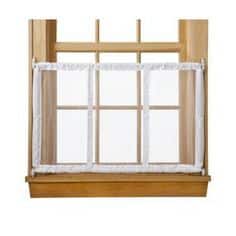
To help prevent falls from second floor windows and balconies use window guards and safety netting. Check these safety devices frequently to make sure they are secure and properly maintained. There should be no more than 4 inches of space between the bars of the window guard. Be sure that at least one window guard in each room can be easily removed in the event of an emergency such as a fire. Do not trust a window screen to prevent a fall, they are not strong enough to hold back a child.
Edge Bumpers:Consider using corner and edge bumpers to help prevent injuries from falls against sharp edges of furniture and fireplaces. Children trip and fall often, so covering any areas in the home that could cause injury from a fall should be cushioned. When looking for dangerous areas, try to look at it from a child’s point of view.
Receptacle Covers: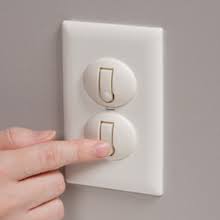
Receptacle or outlet covers help to prevent children from electrical shock and possible electrocution. Use outlet protectors that cannot be easily removed by children and are large enough so that children cannot choke on them.
Carbon Monoxide Detectors:Like smoke detectors, carbon monoxide (CO) detectors are important as well. Locate one outside of the bedrooms to help protect against CO poisoning. Be sure to install one on every floor of the home. Households that should use CO detectors include those with gas or oil heat, gas water heaters, or homes with attached garages. These detectors will sound an alarm if CO (carbon monoxide gas) reaches dangerous levels. If the alarm sounds, leave the home at once and call your local fire department.
Window Blind Cords:Check window blind cords to make sure they aren’t long enough for a child to become entangled in. Children have been strangled by window blind cords.
Cordless blind and window treatments are best. Although not all families are able to replace all products, it is important that parents understand that any corded blind or window treatment can still be a hazard.
Door Stops: Doors can be dangerous, especially to little fingers. Consider using door stops and door holders to help prevent injuries to fingers and hands. When door stops and door holders are used on doors and door hinges they can help prevent small fingers and hands from being pinched or crushed in doors and door hinges. Cordless Phones: Phone lines and phone wires can be a hazard much like window blind cords. Children can get tangled up and possibly strangled. Cell phones and cordless phones also make it easier to watch young children, especially when they’re in bathtubs, swimming pools, or other potentially dangerous areas. Cordless phones help you watch your child continuously without leaving the vicinity to answer a phone call.In summary, there are a number of different safety devices that can be purchased, many of them are relatively inexpensive. to ensure the safety of children in the home. Homeowners can ask an InterNACHI inspector about these and other safety measures during their next maintenance inspection. Parents should be aware of their surroundings and do their own consumer research to find the most effective safety devices for their home that are age-appropriate for their children’s protection.
Electricity is a necessary a part of our lives. However, it can possess extreme danger. Electrical systems generally will work for ever, if correctly used and not overloaded or damaged. Electrical fires kill 485 Americans every year and harm 2,305 more. Some of these flames are brought about by electrical failures and carelessness, however many more are created by the homeowner not understanding the hazards that come from incorrectly wired circuits or the improper use of extension cords. Plugging to many devices into an outlet can overload and overheat the circuit creating a shock hazard or fire hazard.
Some safety tips to remember:
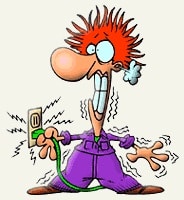
- Only use the correct type and size fuse for a circuit.
- If you find an overloaded circuit, repair it before continuing to use it.
- Never use extension cords for anything other than their intended purpose. Extension cords are never to be used in place of permanent wiring.
- Outlets within 6 feet of water should be GFCI protected.
- Never climb any trees that are near power lines.
- Make sure ladders, kites, and anything stay away from overhead power lines.
Electrical Panels
Electricity enters the home through a meter and switch where one can shut off all of the electricity at once. The switch is usually located in a panel outside of the home. Usually it is some form of a circuit breaker, however, if it is an older panel it may contain fuses. Make sure the right size breaker or fuse is used for the circuit it is protecting. Never use anything other what is supposed be used, for example, never use a penny in place of a fuse. If you think have blown a fuse, look for the broken metal strip in the top, that usually indicates which fuse has blown. Change the fuse with another one stamped with the right amperage. Reset circuit breakers from “off” to “on.” Be certain to look into why the circuit blew or breaker tripped. Usually a overload circuit or a defective device or appliance is the cause. Check the wattage on labels to sure they are not to large for the circuit. In the event that there is a damaged wire or other fault, you contact an electrician to evaluate the circuit and make any repairs necessary.
Outlets and Extension Cords
Be sure all electrical outlets are three-hole, grounded outlets. If the outlets are with-in 6 feet of water, there should be a GFCI or ground-fault circuit interrupter outlet installed. All outlets that are outdoors should be GFCIs. There should be enough electrical current to run equipment without tripping circuit breakers or blowing fuses. Try to avoid the use of extension cords. Never place them under rugs. Make sure that if you have to use an extension cord, it is the correct cord for the job.
Electrical Appliances
Appliances need to be treated with respect and care. They need room to breathe. Avoid enclosing them in a cabinet without proper openings, and do not store papers around them. Level appliances so they do not tip. Washers and dryers should be checked often. Their movement can put undue stress on electrical connections. If any appliance or device gives off a tingling shock, turn it off, unplug it, and have a qualified person correct the problem. Shocks can be fatal. Never insert metal objects into appliances without unplugging them. Check appliances periodically to spot worn or cracked insulation, loose terminals, corroded wires, defective parts and any other components that might not work correctly. Replace these appliances or have them repaired by a person qualified to do so.
Electrical Heating Equipment
Portable electrical heating equipment may be used in the home as a supplement to the home heating system. Caution must be taken when using these heating supplements. Keep them away from combustibles, and make sure they cannot be tipped over. Keep electrical heating equipment in good working condition. Do not use them in bathrooms because of the risk of contact with water and electrocution. Many people use electric blankets in their homes. They will work well if they are kept in good condition. Look for cracks and breaks in the wiring, plugs and connectors. Look for charred spots on both sides. Many things can cause electric blankets to overheat. They include other bedding placed on top of them, pets sleeping on top of them, and putting things on top of the blanket when it is in use. Folding the blankets can also bend the coils and cause overheating.
Children
Electricity is important to the workings of the home, but can be dangerous, especially to children. Electrical safety needs to be taught to children early on. Safety plugs should be inserted in unused outlets when toddlers are in the home. Make sure all outlets in the home have face plates. Teach children not to put things into electrical outlets and not to chew on electrical cords. Also monitor the items children are aloud to play with, make sure they do not have access to any metal objects that could be inserted into an outlet. Keep electrical wiring boxes locked. Do not allow children to come in contact with power lines outside. Never allow them to climb trees near power lines, utility poles or high tension towers.
Electricity and Water
A body can act like a lightning rod and carry the current to the ground. People are good conductors of electricity, particularly when standing in water or on a damp floor. Never use any electrical appliance in the tub or shower. Never touch an electric cord or appliance with wet hands. Do not use electrical appliances in damp areas or while standing on damp floors. In areas where water is present, use outlets with GFCIs. Shocks can be fatal.
Animal Hazards
Mice and other rodents can chew on electrical wires and damage them. If rodents are suspected or known to be in the home, be aware of the damage they may cause, and take measures to get rid of them. Contact a pest control company to evaluate your home and remove any vermin. Have a licensed electrician evaluate and repair any damage that may have done.
Outside Hazards
There are several electrical hazards outside the home. Be aware of overhead and underground power lines. People have been electrocuted when an object they are moving has come in contact with the overhead power lines. Keep ladders, antennae, kites and poles away from power lines leading to the house and other buildings. Do not plant trees, shrubs or bushes under power lines or near underground power lines. Never build a swimming pool or other structure under or over the power line leading to your house. Before digging, learn the location of underground power lines. There are companies that specialize in locating underground utilities. If you are not sure, contact your local utility for help.
Do not climb power poles or transmission towers. Never let anyone shoot or throw stones at insulators. If you have an animal trapped in a tree or on the roof near electric lines, phone your utility company. Do not take a chance of electrocuting yourself. Be aware of weather conditions when installing and working with electrical appliances. Never use electrical power tools or appliances with rain overhead or water underfoot. Use only outdoor lights, fixtures and extension cords. Use only bulbs rated for exterior use and make sure they are the correct style and size. Plug into outlets with a GFCI. Downed power lines are extremely dangerous. If you see a downed power line, call the electric company, and warn others to stay away. If a power line hits your car while you are in it, stay inside unless the car catches fire. If the car catches fire, jump clear without touching metal and the ground at the same time.
More Safety Precautions:
- Routinely check your electrical appliances and wiring.
- Hire an InterNACHI inspector. InterNACHI inspectors must pass rigorous safety training and are knowledgeable in the ways to reduce the likelihood of electrocution.
- Frayed wires can cause fires. Replace all worn, old and damaged appliance cords immediately.
- Use electrical extension cords wisely and don’t overload them.
- Keep electrical appliances away from wet floors and counters; pay special care to electrical appliances in the bathroom and kitchen.
- Don’t allow children to play with or around electrical appliances, such as space heaters, irons and hair dryers.
- Keep clothes, curtains and other potentially combustible items at least 3 feet from all heaters.
- If an appliance has a three-prong plug, use it only in a three-slot outlet. Never force it to fit into a two-slot outlet or extension cord. Never cut the third prong off to make it fit a two slot outlet.
- Never overload extension cords or wall sockets. Immediately shut off, then professionally replace, light switches that are hot to the touch, as well as lights that flicker. Use safety closures to childproof electrical outlets.
- Check your electrical tools regularly for signs of wear. If the cords are frayed or cracked, replace them. Replace any tool if it causes even small electrical shocks, overheats, shorts out or gives off smoke or sparks.
- Do not place towels or any other flammable object over bathroom door or near heat lamp when a heat lamp is present in bathroom ceiling.
In summary, household electrocution can be greatly reduced by following the tips offered in this guide.

The holidays are a time for family and friends to get together and celebrate, and that means more cooking, home decorating, entertaining, and an increased risk of fire and accidents. To make your Holiday season safer and more enjoyable, please consider the following safety tips:
Holiday Lighting
- Use caution when decorating for the holidays, whenever possible, use decorations made with flame-resistant, flame-retardant and non-combustible materials.
- Be sure to keep candles away from decorations, curtains and other flammable materials, and do not use candles to decorate Christmas trees. No matter what type of tree. Besides the fact trees can burn, they also can tip over easily and start a fire.
- Carefully inspect new and previously used light strings. Light strings are very inexpensive and should be replaced if there is any doubt as to their safety. If you have any questions about electrical safety, ask us during your next maintenance inspection. Do not overload extension cords.
- Do not mount lights in any way that can damage the insulation covering the wire. To hold lights in place, string them through hooks or insulated staples, don’t use nails or tacks. Do not drive staples to far in or the insulation may become damaged. Wires should be just held in place with the ability to move slightly. Never pull or tug lights to remove them.
- Keep children and pets away from light strings and electrical decorations. Make sure children and pets can not pull or chew on any electrical decorations or light strings.
- Never use electric lights on a metallic tree. The tree can become charged with electricity from damaged light strings, and a person touching a branch could receive an electric shock. Remember it only takes 40 milliamps to stop a persons heart.
- Before using lights outside, check labels to be sure they have been certified for outdoor use. Not all light strings are rated for outdoor use. When installing outdoor lights, be sure to plug them into a GFCI protected outlet.
- When inspecting your light strings, make sure all the bulbs work and that there are no frayed wires, broken sockets or loose connections. When in doubt, replace the light string.
- Do not leave lights or electrical decorations on when you are not going to be home. The wiring used in the construction of decorations is not of a very high quality, and can fail and cause a fire very easily.
Decorations
- Use only non-combustible and flame-resistant materials to trim a tree. Choose tinsel and artificial icicles of plastic and non-leaded metals.
- If small children and pets are in the home, take special care to avoid decorations that are sharp and breakable and keep trimmings with small removable parts out of the reach of children and pets. Keep in mind that pets, especially cats love tinsel, if tinsel is swallowed it can cause severe intestinal problems.
- Avoid trimmings that resemble candy and food that may tempt a young child or pets to put them in their mouth.
Holiday Entertaining
- Cooking is one of the leading causes of home fires in the U.S. When cooking for holiday visitors, remember to keep an eye on the range. Also be aware that small children can be curious about holiday treats being prepared in the kitchen and can receive serious burns if not closely monitored.
- Provide plenty of large, deep ashtrays, and check them frequently. Be sure that cigarette butts are completely out before being placed in the trash.
- Keep matches and lighters up high, out of sight and reach of children (preferably in a locked cabinet). Use lighters that have child safety locks.
- Replace the batteries and test your smoke alarms, and let guests know what your fire escape plan is.
Trees
- If you purchase a live tree, check it for freshness. A fresh tree is green, needles are hard to pull from branches, and when bent between your fingers, needles do not break. Make sure you keep plenty of water in the tree stand.
- When setting up a tree at home, place it away from fireplaces, radiators and portable heaters. Place the tree out of the way of traffic so it is not easily knocked over. Do not block doorways. If you purchased a fresh tree, make a fresh cut about an inch from the end to help it draw in water.
Fireplaces
- Before lighting any fire, remove all greens, boughs, papers and other decorations from fireplace area. Check to see that the flue is open. Set the damper correctly.
- Use care with “fire salts,” which produce colored flames when thrown on wood fires. They contain heavy metals and toxins that can cause severe intestinal irritation and vomiting if eaten.
- Do not burn wrapping papers in the fireplace. Loose papers, like wrapping papers can ignite suddenly into a flash fire and burn out of control.
Toys and Ornaments
- When shopping for toys, make note of the recommended age on the package. Toys for older children many times have small parts or other items that may hazardous for younger children.
- Toys with sharp points, sharp edges, strings, cords, and parts small enough to be swallowed should not be given to small children or accessible to pets.
- Place older ornaments and decorations that might be painted with lead paint or can be easily broken out of the reach of small children and pets.
Children and Pets
- Be aware of certain plants. Poinsettias are known to be poisonous to humans and animals, so keep them well out of reach, or avoid having them.
- Keep decorations at least 6 inches above the child’s reach.
- Keep any ribbons on gifts and tree ornaments shorter than 7 inches. A child could wrap a longer strand of ribbon around their neck and choke. Many times pets find ribbons interesting and could try and eat them.
- Watch children and pets around space heaters or the fireplace. Do not leave a child or pet unattended, they could get seriously burned or accidentally start a fire.
- Store scissors and any other sharp objects that you use to wrap presents out of your child’s reach.
- Inspect wrapped gifts for small decorations, such as candy canes, gingerbread men, and mistletoe berries, all of which are choking hazards and could be fatal to pets.
- When storing any items that you want kept away children, pay close attention that they do not know where you hid them. Children will try and climb to get something they want if they know its there.
Security
- Use your home burglar alarm system. Many people own an alarm system and never take the time to use it. If it is not functioning correctly, consider having it repaired. Burglars like to break into homes around the holidays because they know a lot of new items are present.
- If you plan to travel for the holidays, don’t discuss your plans with strangers. Have a trusted friend or neighbor to keep an eye on your home. Make sure your mail is collected regularly and have some lights turn on and off at random times.
YOUR NEIGHBORHOOD
InterNACHI HOME INSPECTOR
WISHES YOU A SAFE &
JOYOUS HOLIDAY SEASON!
Do not use chemical drain cleaners. While these drain cleaners can clear most clogged drains they also corrode the inside of the drain pipe leaving behind a rough surface and over time this rough surface will be prone to trap debris faster and more often, causing you to add chemicals more often. This process will eventually lead to having the pipes replaced.
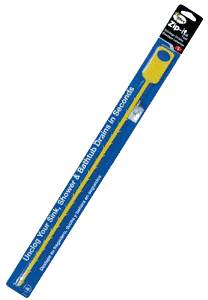
A “Zip-It” cleaner will clear most traps without the need for a plumber or chemical cleaner. You can find these at most home improvement centers for less than $5.00.
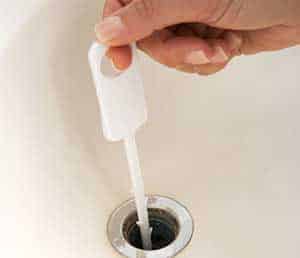
Simply run some hot water while inserting the
“Zip-It” cleaner into the drain a couple of times cleaning it off in between. Let the water run for about 5 minutes and drain should be flowing like new. This is great for tubs and showers where the drain trap is not accessible.
By using inexpensive tools and tips like this you can take care of most simple repairs, before they become expensive repair bills!
Orlando Home Inspection, Deland, Daytona, Apopka, Deltona Home Inspector, Winter Park Home Inspection, Daytona Beach, Altamonte Springs, Casselberry, Winter Springs, Lake Mary Home Inspector, Sanford Home Inspector, Oviedo, Orlando Home Inspector




